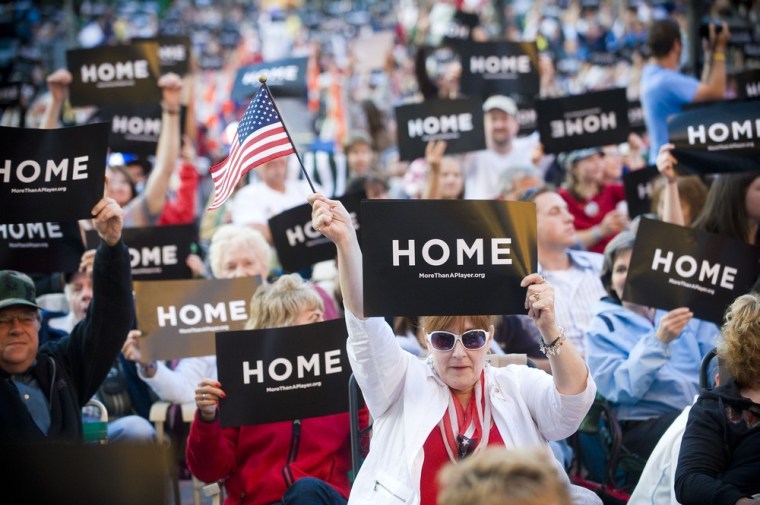Before LeBron James, there were thousands of empty seats for most Cleveland Cavaliers games and downtown was silent after dark. With him, every game is a sellout and nearby bars and restaurants bustle.
As they face the possibility of losing the free-agent NBA superstar, residents wonder if the man they call King James might take a little of this struggling city's economy with him.
"The kingdom lies where the king resides," said Nick Kostis, owner of a restaurant and comedy club on East Fourth Street, a pedestrian-only district near the Cavaliers' arena that began to take off in the early 2000s.
James has been with Cleveland since he was drafted in 2003, but now is at the center of a high-profile pursuit by several NBA teams. The Cavs can offer him a longer and more lucrative contract under league rules, but other teams are trying to convince him that they are his ticket to the championships that have so far eluded him.
James has helped inject untold millions into Cleveland's economy. His team, which had an average home attendance of about 11,500 the year before he joined, sold out every game in its 20,000-seat arena last season. Having arguably the NBA's biggest star also has meant more television revenue and more jersey sales for the Cavs, and a higher profile for their often-maligned city.
"He has created another reason to come visit downtown," said Kostis, owner of Pickwick and Frolic. "He is, in fact, the greatest show on earth. And we love a great show."
East Fourth Street, strung with twinkling lights, is packed with restaurants, coffee shops, bars and — on most nights — people. It has been a beam of hope for Cleveland's downtown, which goes mostly dark after the sun sets.
Kostis, affectionately known as the founding father of East Fourth, acknowledged that the loss of LeBron would be a blow, but believes the area is strong enough to withstand it.
"We're not going to fold up our tents, obviously," he said.
While the presence of a global superstar would be a boon to any city, people here believe that recession-wracked Cleveland needs LeBron more than other hopeful cities trying to woo him away.
New York launched a "C'mon LeBron" campaign, featuring Mayor Michael Bloomberg and a host of celebrities, to persuade the 25-year-old to come to Madison Square Garden and the Big Apple. Chicago and Miami are among the other contenders.
The Cleveland Sports Commission is promoting Morethanaplayer.org, a website that chronicles the city's daily efforts to convince LeBron to stay and serves as a sounding board for worried fans. Large banners reading "Home: More Than A Player" have been attached to the sides of buildings and hung over downtown streets.
Hundreds of fans made an appeal to keep James in a Cleveland uniform Thursday night by holding up "Home" posters at a rally. The word "home" was also spelled out vertically in the lights of a nearby building.
It's impossible to say exactly how much money the city might lose if James leaves, but Dave Gilbert, the sports commission's CEO, said LeBron equals travel and tourism money.
Each home game during the regular season nets about $3.7 million, including ticket sales, souvenirs, food and hotel bookings, said Tamera Brown, vice president of marketing for Positively Cleveland, a convention and visitors bureau that promotes city tourism. Multiplied by 41 home games, that's more than $150 million.
Obviously, much of that will stay in town even if James leaves. How much depends largely on how well the Cavaliers perform, but Gilbert said LeBron has his own special fan base because of his two-time MVP status and because he grew up in nearby Akron.
"Having less of those fans certainly means less money being spent," Gilbert said.
The Cavaliers' contribution to the city's economy is comparable to that of the Rock and Roll Hall of Fame and Museum, which has an economic impact of more than $100 million annually, Brown said.
Some doubt that a single sports star can have much impact on a city's economy.
Justin Sydnor, assistant professor of economics at Case Western Reserve University's Weatherhead School of Management, said people are still going to spend their money, whether it's at a Cavaliers game or at a downtown restaurant.
"Assuming the average person spends $20 to $30 downtown eating," Sydnor said. "You might lose about $20 million a year from people coming into the city from the suburbs who wouldn't come otherwise."
But Sydnor cautioned that such estimates are just that: educated guesses.
Justin Ferriman, who was strolling down East Fourth on a cool summer evening, said he thinks the area's popularity is enduring. He pointed out that both Progressive Field, home to the Cleveland Indians, and the Cleveland Browns Stadium are within walking distance.
"I don't think him leaving would have any impact on East Fourth," Ferriman said. "The Indians are real close by. People are gonna support the Cavs no matter what."
